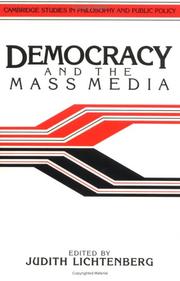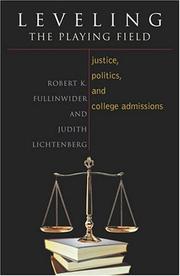| Listing 1 - 8 of 8 |
Sort by
|

ISBN: 0521388171 0521381223 1139172271 9780521381222 9780521388177 9781139172271 Year: 1990 Publisher: Cambridge: Cambridge university press,
Abstract | Keywords | Export | Availability | Bookmark
 Loading...
Loading...Choose an application
- Reference Manager
- EndNote
- RefWorks (Direct export to RefWorks)
In this volume a group of distinguished legal and political theorists and experts on journalism discuss how to reconcile our values concerning freedom of the press with the enormous power of the media - especially television - to shape opinions and values. The policy issues treated concern primarily the extent of justifiable government regulation of the media and the justification for regulating television differently from newspapers. The volume contains some highly original and groundbreaking analyses of philosophical issues surrounding the First Amendment of the US Bill of Rights. This is a book for anyone seriously interested in the rights to free speech and expression in technologically advanced societies.
Political systems --- Mass communications --- Etat et presse --- Press and government --- Press policy --- State and the press --- Massamedia en politiek --- communicatie. --- Freedom of the press --- Government and the press --- Journalism --- #SBIB:309H1016 --- 316.774.16 --- Press --- Press and politics --- Censorship of the press --- Liberty of the press --- Press censorship --- Censorship --- Freedom of expression --- 316.774.16 Massamedia: maatschappelijk, politiek, ideologisch, ethisch, juridisch, socio-cultureel--(communicatiesociologie) --- Massamedia: maatschappelijk, politiek, ideologisch, ethisch, juridisch, socio-cultureel--(communicatiesociologie) --- Political aspects --- Media: socio-culturele aspecten (massamedia en maatschappij, met inbegrip van cultuurhistorische werken en werken over de maatschappelijke en politieke effecten van de (diverse) media) --- Government policy --- Law and legislation --- Freedom of the press. --- Government and the press. --- Bestelvoorstellen --- Persvrijheid --- Political aspects. --- Algemeen --- Verenigde Staten. --- Mass media --- Liberté de la presse --- Presse --- Médias --- Aspect politique --- Addresses, essays, lectures --- Journalism - Political aspects. --- Arts and Humanities --- Philosophy --- Journalism - Political aspects
Book
ISBN: 9780521763318 9780521124621 9781139049290 Year: 2014 Publisher: Cambridge Cambridge University press
Abstract | Keywords | Export | Availability | Bookmark
 Loading...
Loading...Choose an application
- Reference Manager
- EndNote
- RefWorks (Direct export to RefWorks)
Poverty --- Wealth --- Social ethics. --- Poor. --- Rich people. --- Moral and ethical aspects. --- Prevention.
Book
ISBN: 1107453119 1107460263 1139049291 0521763312 052112462X Year: 2014 Publisher: Cambridge : Cambridge University Press,
Abstract | Keywords | Export | Availability | Bookmark
 Loading...
Loading...Choose an application
- Reference Manager
- EndNote
- RefWorks (Direct export to RefWorks)
What must affluent people do to alleviate global poverty? This question has occupied moral and political philosophers for forty years. But the controversy has reached an impasse: approaches like utilitarianism and libertarianism either demand too much of ordinary mortals or else let them off the hook. In Distant Strangers, Judith Lichtenberg shows how a preoccupation with standard moral theories and with the concepts of duty and obligation have led philosophers astray. She argues that there are serious limits to what can be demanded of ordinary human beings, but this does not mean we must abandon the moral imperative to reduce poverty. Drawing on findings from behavioral economics and psychology, she shows how we can motivate better-off people to lessen poverty without demanding unrealistic levels of moral virtue. Lichtenberg argues convincingly that this approach is not only practically, but morally, appropriate.
Wealth --- Poverty --- Social ethics. --- Rich people. --- Poor. --- Disadvantaged, Economically --- Economically disadvantaged --- Impoverished people --- Low-income people --- Pauperism --- Poor --- Poor, The --- Poor people --- Persons --- Social classes --- Affluent people --- High income people --- Rich --- Rich, The --- Rich people --- Wealthy people --- Ethics --- Social problems --- Sociology --- Destitution --- Basic needs --- Begging --- Subsistence economy --- Wealth, Ethics of --- Business ethics --- Moral and ethical aspects. --- Economic conditions

ISBN: 0742514110 0742514102 9780742514102 9780742514119 Year: 2004 Publisher: Lanham (Md.): Rowman & Littlefield,
Abstract | Keywords | Export | Availability | Bookmark
 Loading...
Loading...Choose an application
- Reference Manager
- EndNote
- RefWorks (Direct export to RefWorks)
Multi

ISBN: 9780823295968 9780823215621 Year: 2023 Publisher: New York, N.Y. Fordham University Press
Abstract | Keywords | Export | Availability | Bookmark
 Loading...
Loading...Choose an application
- Reference Manager
- EndNote
- RefWorks (Direct export to RefWorks)
Book

ISBN: 9780823295968 Year: 2023 Publisher: New York, NY
Abstract | Keywords | Export | Availability | Bookmark
 Loading...
Loading...Choose an application
- Reference Manager
- EndNote
- RefWorks (Direct export to RefWorks)
Book

ISBN: 9781400845347 Year: 2013 Publisher: Princeton, NJ
Abstract | Keywords | Export | Availability | Bookmark
 Loading...
Loading...Choose an application
- Reference Manager
- EndNote
- RefWorks (Direct export to RefWorks)
Digital

ISBN: 9781400845347 9780691137568 Year: 2013 Publisher: Princeton, N.J. Princeton University Press
Abstract | Keywords | Export | Availability | Bookmark
 Loading...
Loading...Choose an application
- Reference Manager
- EndNote
- RefWorks (Direct export to RefWorks)
| Listing 1 - 8 of 8 |
Sort by
|

 Search
Search Feedback
Feedback About UniCat
About UniCat  Help
Help News
News